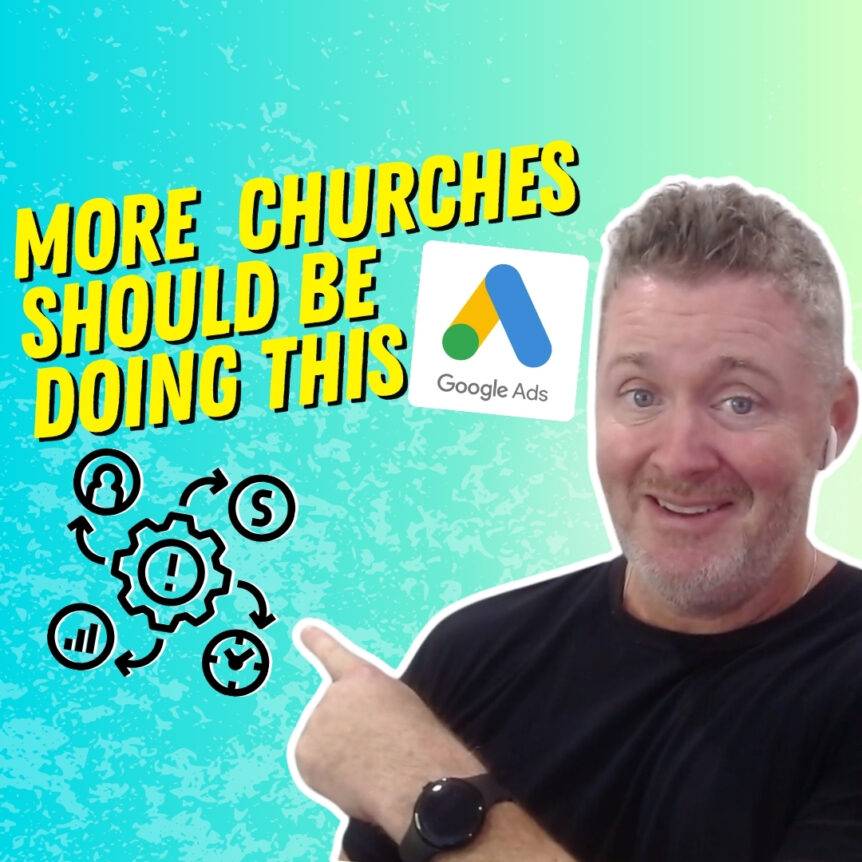Google Ads can be a powerful tool for churches looking to expand their reach and connect with more people. By leveraging this platform, churches can effectively promote events, share inspiring messages, and engage with their community in new ways.
The key to maximizing impact with Google Ads lies in understanding how to create targeted campaigns that resonate with your audience. In this article, we’ll cover everything your church needs to know about Google ads. Then, we’ll cover our top 5 advanced strategies for maximizing your impact with these ads.
With our strategic approach, Google Ads can help your church grow your congregation, increase participation in activities, and spread your message of hope and faith more broadly than ever before. Ready to learn more?
Let’s dive in.
Estimated reading time: 11 minutes
Table of contents
Church Google Ads

Before we learn any advanced strategies, let’s cover exactly what Google Ads are, and how your church can use them effectively. We’ll also cover Google Ad Grants, which is a program that can be hugely helpful for nonprofits like churches.
Understanding Google Ads
Google Ads is an online advertising platform that allows businesses, organizations, and even churches to promote their messages and services across the internet. Through Google Ads, churches can create advertisements that appear in Google Search results, YouTube videos, and other websites within Google’s ad network.
The idea is to help your church reach a broader audience by targeting specific keywords related to your message, events, or services. For instance, when someone searches for “local church events” on Google Search, your ad can appear at the top of the search results, increasing the likelihood that they will click on your ad and learn more about your church.
Google Ad Grants for Churches
One of the most beneficial aspects of using Google Ads for churches is the Google Ad Grants program. This program provides eligible non-profit organizations, including churches, with up to $10,000 per month in free advertising credit on Google Ads.
To take advantage of this opportunity, your church must apply for a Google Ad Grant account. Once approved for a Google Ad Grants Account, you can start creating ad campaigns without worrying about the cost, allowing you to focus on crafting effective ads that resonate with your audience.
The Google Ad Grants program is specifically designed to help non-profits expand their reach and visibility, making it a perfect fit for churches looking to grow their congregations and community impact.
Managing a Google Ad Grant Account

Managing a Google Ads account effectively is crucial for churches using the Google Ad Grant. Google Ad Grant management involves overseeing your ad campaigns to ensure they perform well and comply with the program’s requirements. Here’s a simple guide to get you started.
First, set up your Google Ads account and ensure it’s linked to your Google Grant. This account will be where you create, monitor, and adjust your ads. As we’ve mentioned, the Google Grant gives you up to $10,000 per month in free advertising credit, but it comes with specific rules, such as maintaining a 5% click-through rate (CTR) and using geo-targeting to reach local audiences. This essentially allows you to produce free google ads instead of paid ads.
Next, focus on creating relevant and engaging ads. Choose keywords that people in your community might use when searching for a church or related activities. Write clear and inviting ad copy, highlighting unique aspects of your church like welcoming services or special events.
Regularly monitor your Google Ads account to see how your ads are performing. Use the analytics tools provided to track which ads get the most clicks and which ones need improvement. Adjust your keywords and ad copy based on these insights to keep your campaigns effective.
Compliance with Google Ad Grant management guidelines is essential. Make sure your ads are active, avoid single-word keywords, and ensure your landing pages are relevant and useful to visitors. Proper management helps maximize the benefits of your Google Grant, allowing your church to reach more people and grow your community effectively.
Google Ads for Churches
In conclusion, Google Ads and the Google Ad Grants program offer churches a valuable opportunity to expand their reach and connect with more people in their community. By understanding how to create targeted campaigns, utilizing the free advertising credit from Google Ad Grants, and continually optimizing your ads, your church can effectively use Google Ads to grow and thrive.
5 Strategies for Maximizing Impact

Now that we’ve learned more about Google Ads and how your church can take advantage of the Google Ad Grant, let’s explore 5 strategies for maximizing the impact of your google ads. These strategies are all things you can start implementing today for more effective advertising. Ready to find out?
Let’s jump in.
1. Target the Right Keywords
Targeting the right keywords is crucial for making your church’s Google Ads effective. Start by doing keyword research to find out which terms people in your area are using when they search for a church or related activities. Keyword research tools can help you identify popular search terms. Look for keywords like “local church,” “Sunday service,” “community outreach,” and “youth programs.”
Once you have a list of keywords, think about which ones best match what your church offers. You want to choose words that reflect your church’s unique strengths and events. For example, if your church has a strong music program, you might use keywords like “church choir” or “live worship music.”
It’s also important to use a mix of broad and specific keywords. Broad keywords, like “church near me,” can reach a wide audience, while specific keywords, like “youth Bible study,” can attract people looking for particular activities.
Regularly update your keyword list based on the performance of your ads on Google Analytics. Check which keywords are bringing the most visitors to your site and adjust your list accordingly. By targeting the right keywords, your church can reach more people and grow its community.
2. Write Solid Ad Copy
Writing solid ad copy is key to attracting people to your church through Google Ads. Start with a clear and engaging headline that grabs attention. Your headline should reflect what your church offers and make people want to learn more. For example, “Join Our Welcoming Community” or “Experience Inspiring Worship Services.”
Next, create a concise and compelling description. Highlight the unique aspects of your church, such as friendly congregations, exciting youth programs, or special events. Use simple language and be direct. For example, “Visit us this Sunday for a warm welcome and uplifting message. We offer activities for all ages and a supportive community.”
Include a strong call-to-action in your ad copy. Encourage people to take the next step, whether it’s visiting your website, attending a service, or signing up for an event. Phrases like “Join us this Sunday” or “Learn more about our programs” can be very effective.
Remember to match your ad copy with the content on your landing page. If your ad promotes a special event, make sure the link directs people to a page with detailed information about that event. By writing solid ad copy, you can create engaging ads that draw people to your church and its activities.
3. Use Geo-Targeting

Using geo-targeting is a smart way to make sure your church’s Google Ads reach people in your local area. Geo-targeting allows you to set specific geographic boundaries for your ads, ensuring that only people within a certain distance from your church see them.
To start, log into your Google Ads account and select the geo-targeting option. You can choose to target by city, zip code, or a radius around your church’s location. This is especially useful for churches, as most people are likely to attend services close to where they live.
When setting up geo-targeting, think about how far people are willing to travel to visit your church. A 10 to 20-mile radius is often a good starting point. You can adjust this based on the size of your community and how far people in your area are typically willing to travel.
Geo-targeting ensures your ads are seen by those most likely to visit your church, making your advertising budget more effective. It also helps you create more relevant ads by focusing on local events and community-specific messages. By using geo-targeting, your church can connect with nearby residents and grow its local presence effectively.
4. Optimize Your Landing Page
Optimizing your landing page is essential to making your Google Ads effective for your church. A good landing page provides visitors with the information they need and encourages them to take action. So what if your ad is good and get clicks? If people don’t like what they see after they click, it won’t mean anything anyway.
First, make sure your landing page is clear and easy to navigate. Use a clean design with headings and bullet points to make information easy to read. Include all the important details like service times, location, contact information, and upcoming events. People should quickly understand what your church offers and how to get involved.
Second, match the content of your landing page to the ad that brought people there. If your ad promotes a special event, the landing page should have detailed information about that event. Consistency helps keep visitors engaged and reduces bounce rates.
Third, include a strong call-to-action on your landing page. Encourage visitors to do something specific, like signing up for a newsletter, attending a service, or contacting the church. Phrases like “Join us this Sunday” or “Learn more about our community programs” can motivate visitors to take the next step.
Finally, ensure your landing page is mobile-friendly. Many people will visit your page from their phones, so it needs to look good and work well on smaller screens. By optimizing your landing page, you can turn more visitors into active members of your church community.
5. Utilize Ad Extensions
Utilizing ad extensions can make your church’s Google Ads more effective by providing additional information and making your ads stand out. Ad extensions are extra bits of information that can be added to your ads, such as links to specific pages on your website, your church’s address, or a call button.
Start by adding sitelink extensions. These are additional links that appear below your main ad, directing visitors to specific pages on your website. For example, you could include links to your “About Us” page, “Upcoming Events,” or “Volunteer Opportunities.”
Location extensions are also important. They show your church’s address and can even link to a map, making it easy for people to find you. This is particularly useful for attracting local visitors who are looking for a nearby church.
Another useful extension is the call extension, which adds a phone number to your ad. This allows people to call your church directly from the ad, making it easier for them to get in touch with you.
By utilizing ad extensions, you can provide more information and make your ads more engaging. This can increase the chances that people will click on your ads and visit your church, helping you grow your community.
Outreach with Google Search Ads

In conclusion, using Google Ads effectively can significantly enhance your church’s outreach and community engagement. By leveraging tools like the Google Ad Grants program, conducting thorough keyword research, writing compelling ad copy, and utilizing features such as geo-targeting and ad extensions, your church can create powerful ad campaigns that resonate with your audience.
Optimizing your landing pages ensures that visitors find relevant information quickly, encouraging them to take the next step in connecting with your church. Regularly monitoring and adjusting your strategies based on performance metrics will help you continuously improve your ads’ effectiveness.
With these strategies, your church can extend its reach, attract new members, and foster a stronger, more vibrant community. We pray success over your church’s Google Ads endeavors. God bless!
More Resources on Google Ads





